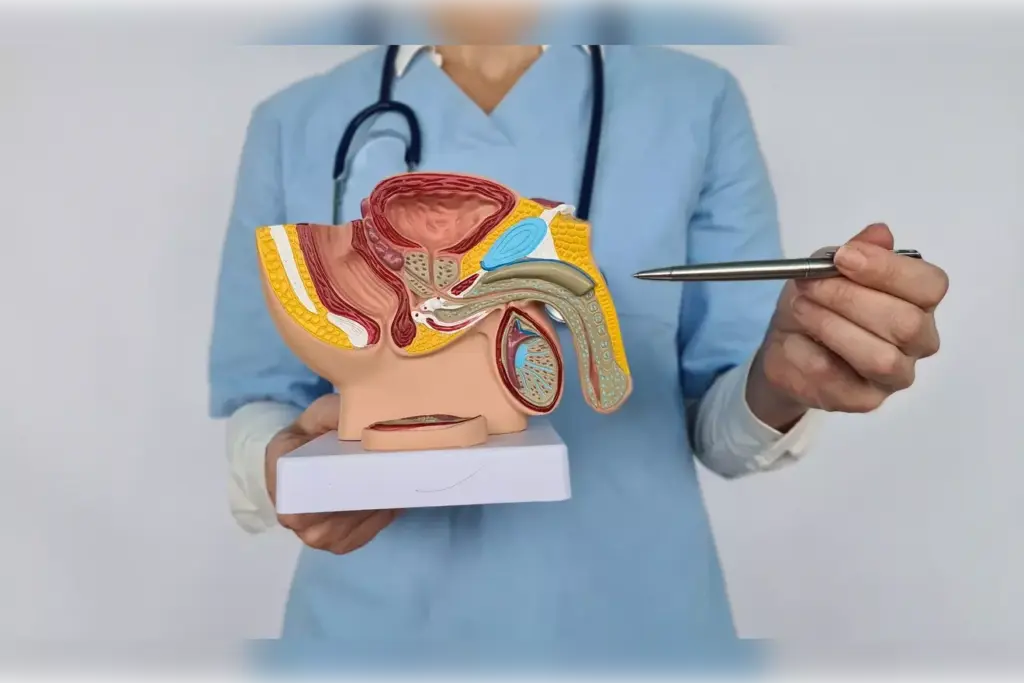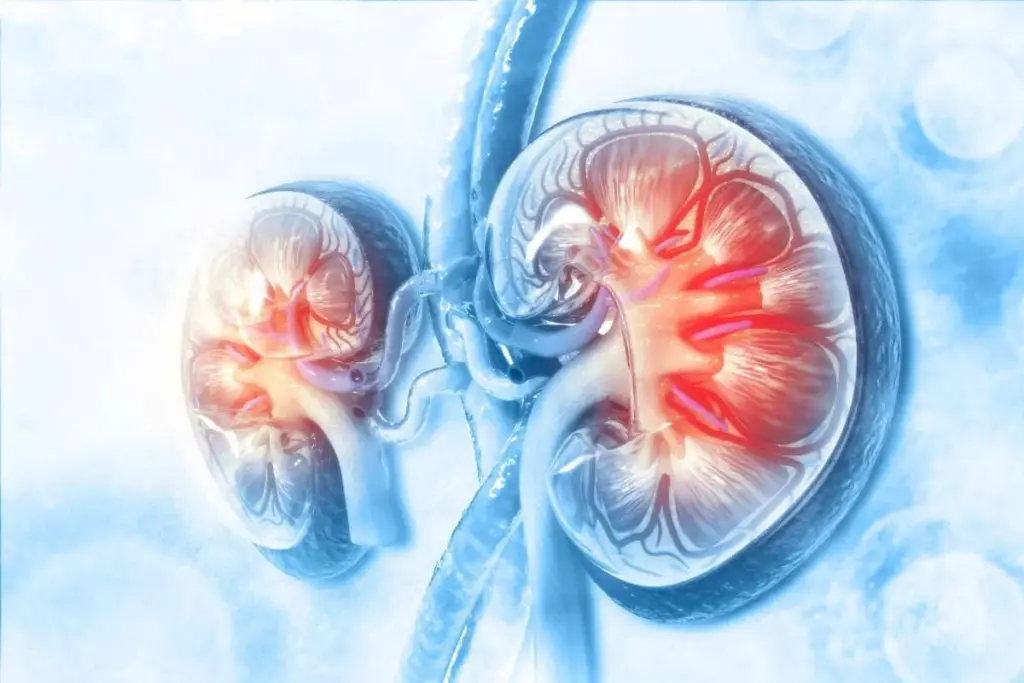
Prostate removal, or radical prostatectomy, is a surgery for prostate cancer. It helps remove cancer but can affect a man’s sexual health. This includes changes in ejaculation and orgasm.
At Liv Hospital, we know men need full care and support after surgery. We tell them that prostate removal means they can’t ejaculate anymore. But, most men can feel orgasm and sexual pleasure. Our focus is on each patient, giving them the best care and support.
Key Takeaways
- Prostate removal surgery can impact a man’s ability to ejaculate.
- Most men can stillexperience orgasm and sexual pleasure after surgery.
- Liv Hospital providescomprehensive care and support for men undergoing prostate removal.
- A patient-centered approach ensures access to the latest information and multidisciplinary support.
- Innovative rehabilitation and medical expertise can make a significant difference in sexual health outcomes.
Understanding Prostate Removal Surgery
Prostate removal, or prostatectomy, is a common surgery for prostate issues. Radical prostatectomy is often chosen for men with localized prostate cancer. This surgery removes the prostate gland and sometimes nearby tissues to get rid of cancer cells.
What is Radical Prostatectomy?
Radical prostatectomy removes the prostate gland and some surrounding tissue. This includes the seminal vesicles and sometimes the vas deferens. The main goal is to remove cancerous prostate cells to stop cancer spread.
There are different ways to do this surgery, like open, laparoscopic, or robot-assisted surgery. Each method has its own benefits and risks. It’s important to talk to a healthcare provider to find the best option.
Common Reasons for Prostate Removal
The main reason for prostate removal is prostate cancer. It’s also used for severe prostatitis or benign prostatic hyperplasia (BPH) when other treatments don’t work.
Prostate cancer is the main concern. Radical prostatectomy is chosen when cancer is only in the prostate. Deciding on surgery involves weighing the benefits and risks, including how it might affect urination and sex life.
Types of Prostatectomy Procedures
There are several prostatectomy procedures, each for different reasons and benefits:
| Procedure Type | Description | Indications |
|---|---|---|
| Radical Prostatectomy | Removal of the prostate gland and surrounding tissues. | Localized prostate cancer |
| Simple Prostatectomy | Removal of the inner part of the prostate. | Benign prostatic hyperplasia (BPH) |
| Laparoscopic Prostatectomy | Minimally invasive surgery using small incisions. | Prostate cancer, BPH |
| Robot-Assisted Prostatectomy | Precision surgery assisted by robotic technology. | Prostate cancer |
Knowing about these procedures helps patients make informed choices. It’s key to talk to a healthcare provider to figure out the best treatment.
The Physiological Role of the Prostate in Ejaculation
Ejaculation is a complex process involving multiple glands, with the prostate being a key player. We will explore how the prostate contributes to ejaculation and the overall reproductive health of men.
How Normal Ejaculation Works
Normal ejaculation is a highly coordinated process. It involves the contraction of muscles and the release of seminal fluid. This process is key for delivering sperm during reproduction.
The physiological process includes the contraction of the pelvic floor muscles. It also involves the release of semen. Semen contains sperm from the testes, fluids from the prostate, and other secretions.
The Prostate’s Contribution to Semen Production
The prostate gland secretes a significant portion of the seminal fluid. This fluid nourishes sperm and helps them travel during ejaculation. The prostatic fluid is rich in enzymes, zinc, and other components that support sperm health and function.
Other Glands Involved in Ejaculation
Besides the prostate, other glands like the seminal vesicles contribute to semen production. The seminal vesicles produce a lot of the seminal fluid. The testes produce sperm. Together, these glands ensure the production of healthy semen.
Can You Ejaculate After Prostate Removal?
Removing the prostate gland changes how men ejaculate. Most can’t ejaculate the way they used to. We’ll look at what happens after surgery.
The Physical Reality of Ejaculation Post-Surgery
After prostate removal, ejaculation changes a lot. The prostate and seminal vesicles, key in making seminal fluid, are gone. So, men usually have dry orgasms with little to no fluid.
For more info, check Medical News Today. They explain how prostate removal affects sex.
Why Traditional Ejaculation Becomes Impossible
Ejaculation needs fluid from the testes, seminal vesicles, prostate, and bulbourethral glands. After prostate surgery, the seminal vesicles are often gone or can’t connect to the urethra. So, the main parts of seminal fluid are missing, making normal ejaculation impossible.
What Happens During Sexual Climax Without a Prostate
Men can have an orgasm without a prostate, but it’s usually dry. They might not feel the usual ejaculation. But, the feeling of pleasure and orgasm can stay, even if it feels different.
It’s important to understand these changes. They help men adjust to their new sexual life after surgery. Even though ejaculation changes, many men find new ways to enjoy orgasms.
Dry Ejaculation After Prostate Surgery
Dry ejaculation, or feeling like you’ve had an orgasm without any fluid, is common after prostate surgery. This happens because the prostate gland is key in making semen. Without it, a big part of the semen is lost.
What Are Dry Orgasms?
Dry orgasms mean you climax without any semen coming out. This is because the prostate gland is removed during surgery. Even without semen, the feeling of orgasm can stay strong, though it might feel different.
Physical Sensations During Dry Climax
How a dry orgasm feels can vary from person to person. Some men say it feels the same, while others notice a change in pleasure. The emotional and mental parts of orgasm can stay the same, even without semen.
Adjusting to the Absence of Fluid
Getting used to dry ejaculation takes time. Men have to accept the change in their body and sex life. It’s important to remember that orgasm isn’t just about semen. Many men find ways to enjoy sex even without it.
Understanding and adjusting to dry ejaculation is key to recovering after prostate surgery. By focusing on what’s left of sexual satisfaction, men can get through this change better.
Timeline for Sexual Recovery After Prostatectomy
Knowing when you can start being sexual again after prostate surgery is key. Everyone recovers differently. This depends on your health, age, and the surgery type.
How Long After Prostatectomy Can You Resume Sexual Activity?
There’s no one answer for when you can start being sexual again. Doctors usually say wait until they check on you after you’ve healed a bit. Always listen to your doctor’s advice because they know what’s best for you.
“Being patient and talking openly with your doctor is important,” says , a top urologist. “Jumping back into sex too soon can cause problems and slow healing.”
Healing Milestones and Sexual Function
There are key signs that show you’re getting better and ready for sex. These include:
- The swelling and pain in your pelvic area going down
- Being able to control your urine
- Getting back your ability to get an erection, which might need special programs
Watching these signs helps you and your doctor know when it’s okay to start being sexual again.
Managing Expectations During Recovery
It’s important to have the right expectations during recovery. Understand that getting back to sex takes time. Setting realistic goals and talking openly with your partner helps a lot. It’s good to share your feelings and worries with your partner for support.
When dealing with sexual recovery after prostate surgery, patience and expert advice are key. They help you get back to a fulfilling sex life after surgery.
Erectile Function Following Prostate Surgery
Prostate removal can affect a man’s ability to get an erection. This is a big worry for men facing surgery. Erectile dysfunction (ED) makes it hard to get or keep an erection for sex.
Common Erectile Challenges After Prostatectomy
Prostate surgery can mess with nerves and blood vessels near the prostate. This can lead to erectile problems. How bad these problems are depends on the surgery and the man’s health before surgery.
Some common issues include:
- Difficulty achieving an erection
- Reduced firmness of erections
- Decreased sexual desire
- Shortened duration of erections
Factors Affecting Erectile Recovery
Many things can affect how well a man recovers from erectile problems after surgery. These include:
- Surgical Technique: Using nerve-sparing methods can help a lot.
- Age: Younger men usually recover faster.
- Pre-operative Erectile Function: Men who were healthy before surgery tend to recover better.
- Overall Health: Conditions like diabetes and high blood pressure can slow recovery.
Timeframe for Erectile Function Improvement
How long it takes to see improvements in erectile function varies. Some men see changes in a few months, while others may take 2-3 years or more. It’s important for men to be patient and work with their doctors to manage their expectations and find treatments.
It’s important to remember that erectile function may not come back right away after surgery. But, thanks to better surgery and care, many men can get their function back over time.
Orgasm Quality and Satisfaction Post-Surgery
It’s important to know how prostate removal affects orgasm. Prostatectomy is a common surgery for prostate cancer and other issues. While it treats the condition, it can change sexual function, including orgasm quality.
Research Statistics on Post-Prostatectomy Orgasms
Studies show that many men have similar orgasm quality after surgery. A study in the Journal of Urology found about 80% of men didn’t notice a big change. But, not having seminal fluid can make orgasms feel different, leading to “dry orgasm.”
Looking at post-surgery orgasms, experiences vary. Some men see a decrease, while others notice no change or even an improvement. What affects these outcomes includes the surgery method, the patient’s age, and their sexual function before surgery.
Factors That Influence Climax After Prostate Removal
Several things can affect orgasm quality after prostate removal. These include:
- The surgical technique: Nerve-sparing methods can help keep sexual function.
- Age: Younger men often recover better sexually.
- Pre-surgery erectile function: Better function before surgery means better after.
Also, having health issues like diabetes can slow down sexual recovery. Knowing these factors helps set realistic hopes.
| Factor | Influence on Climax |
|---|---|
| Surgical Technique | Nerve-sparing techniques can preserve sexual function |
| Age | Younger men tend to have better recovery |
| Pre-Surgery Erectile Function | Better pre-surgery function correlates with better post-surgery outcomes |
Comparing Pre-Surgery and Post-Surgery Experiences
Men’s orgasm experiences after prostatectomy can be very different from before. Some feel less pleasure, while others say it’s the same. A patient in a European Urology study said, “I was prepared for a different experience, but my orgasms feel pretty much the same as before.”
“The absence of seminal fluid can be a significant adjustment, but it doesn’t necessarily detract from the overall experience of orgasm.”
It’s key to compare before and after surgery to understand orgasm changes. By looking at what affects orgasm after prostate removal, men can better prepare and manage their recovery.
Medical Interventions to Improve Sexual Function
Sexual function can be improved after prostate surgery with medical help. Prostate removal surgery can affect a man’s sexual health. But, there are treatments to help restore function and improve life quality.
Penile Rehabilitation Programs
Penile rehabilitation programs help men regain erectile function after prostate surgery. These programs use medications, devices, and lifestyle changes. They aim to improve blood flow, prevent tissue damage, and restore natural erections.
Talking to a healthcare provider about penile rehabilitation options is important. They can help find the best treatment. Common parts of these programs include:
- Phosphodiesterase type 5 (PDE5) inhibitors, such as sildenafil or tadalafil
- Vacuum erection devices
- Penile injections or suppositories
Medication Options for Erectile Dysfunction
Medication is key in managing erectile dysfunction (ED) after prostate surgery. PDE5 inhibitors are often prescribed to help men get and keep erections. These medications increase blood flow to the penis.
Working closely with a healthcare provider is vital to find the right medication and dosage. Some men may need to try different options to find what works best.
Mechanical Aids and Surgical Solutions
For men who don’t respond to medication or prefer other options, mechanical aids and surgery are available. Vacuum erection devices can help by creating a vacuum that draws blood into the penis.
Surgical solutions, like penile implants, offer a permanent fix for ED. These devices are implanted surgically and can be activated for an erection.
Men should discuss these options with their healthcare provider. This helps find the best treatment based on their needs and health.
Communicating With Partners About Sexual Changes
Talking openly about sexual changes after prostate surgery is key. The surgery can affect sex a lot. It’s important to talk about these changes to keep intimacy alive.
Open Dialogue About Expectations
Talking honestly about what you expect is essential. Both should share their feelings and needs. This way, you can adjust and keep your sex life fulfilling.
- Understanding the physical changes that occur after prostate surgery
- Discussing emotional responses to these changes
- Exploring new forms of intimacy that can enhance your connection
By talking about these things, you can adapt to the surgery’s effects together.
Exploring New Forms of Intimacy
Intimacy isn’t just about sex. Finding new ways to be close can strengthen your bond. This could mean:
- Enjoying sensual touch without focusing on orgasm
- Building emotional closeness through shared moments and talks
- Trying medical aids to improve sex life
These steps can lead to new, meaningful ways to connect.
Seeking Couples Counseling
Some couples might need help after surgery. Couples counseling can offer support. A therapist can help you talk better and deal with sexual issues.
Knowing when to ask for help is important. If talking or the changes hurt your relationship, see a therapist.
Conclusion: Embracing Sexual Life After Prostate Removal
Prostate removal surgery can change a man’s sexual life. But it doesn’t mean the end of a fulfilling experience. Understanding the changes after a prostatectomy helps men navigate their sexual health better.
At Liv Hospital, we offer top-notch healthcare for international patients. Our team helps men keep their sexual health and well-being after surgery.
Embracing sexual health after prostate surgery means trying different interventions and talking openly with partners. Men can enjoy a satisfying sexual life again. This is through penile rehabilitation, medication, and other support.
We know every man’s experience is different. Our experts provide personalized care and support. By focusing on sexual health, men can regain confidence and intimacy in their relationships.
FAQ
Can men ejaculate after prostate removal?
Men often have dry orgasms after prostate removal. This is because the prostate and seminal vesicles, which make most of the seminal fluid, are gone. Even though they feel like they’re climaxing, they don’t release much fluid.
What is a dry orgasm?
A dry orgasm is when you feel like you’re climaxing but don’t release any fluid. This happens after prostate removal because the glands that make fluid are removed or changed.
How long after prostatectomy can you resume sexual activity?
How soon you can start being sexual again varies. It depends on your health and the surgery details. Usually, doctors say wait a few weeks to let your body heal.
Can you have an orgasm without a prostate?
Yes, men can have orgasms without a prostate. But, they might feel different than before. Not having fluid can change how you feel during an orgasm, but many men are happy with it.
What are the common erectile challenges after prostatectomy?
Erectile dysfunction is a common issue after prostate removal. Your health, the surgery method, and nerve damage can affect how well you can get an erection.
How can erectile function be improved after prostate surgery?
There are many ways to help with erectile issues. Programs for penile rehabilitation, medicines, and mechanical or surgical options can help.
Why is communication with partners important after prostate surgery?
Talking openly with your partner is key after prostate surgery. It helps you both adjust to changes in sex life. Discussing what you expect, trying new things, and getting counseling can help.
Can medical interventions improve sexual function after prostate surgery?
Yes, medical help can make a big difference. Programs, medicines, and aids can help men get and keep erections, leading to better sex.
How does prostate removal affect the quality of orgasms?
Prostate removal can change how orgasms feel, mainly because of the lack of fluid. But, many men are happy with their orgasms after surgery. Some things can make the experience better or worse.
What happens during sexual climax without a prostate?
Without a prostate, men usually have dry orgasms. They feel like they’re climaxing but don’t release fluid. The feelings might be different, but many men find it satisfying.
Can men ejaculate after prostate removal?
Men often have dry orgasms after prostate removal. This is because the prostate and seminal vesicles, which make most of the seminal fluid, are gone. Even though they feel like they’re climaxing, they don’t release much fluid.
What is a dry orgasm?
A dry orgasm is when you feel like you’re climaxing but don’t release any fluid. This happens after prostate removal because the glands that make fluid are removed or changed.
How long after prostatectomy can you resume sexual activity?
How soon you can start being sexual again varies. It depends on your health and the surgery details. Usually, doctors say wait a few weeks to let your body heal.
Can you have an orgasm without a prostate?
Yes, men can have orgasms without a prostate. But, they might feel different than before. Not having fluid can change how you feel during an orgasm, but many men are happy with it.
What are the common erectile challenges after prostatectomy?
Erectile dysfunction is a common issue after prostate removal. Your health, the surgery method, and nerve damage can affect how well you can get an erection.
How can erectile function be improved after prostate surgery?
There are many ways to help with erectile issues. Programs for penile rehabilitation, medicines, and mechanical or surgical options can help.
Why is communication with partners important after prostate surgery?
Talking openly with your partner is key after prostate surgery. It helps you both adjust to changes in sex life. Discussing what you expect, trying new things, and getting counseling can help.
Can medical interventions improve sexual function after prostate surgery?
Yes, medical help can make a big difference. Programs, medicines, and aids can help men get and keep erections, leading to better sex.
How does prostate removal affect the quality of orgasms?
Prostate removal can change how orgasms feel, mainly because of the lack of fluid. But, many men are happy with their orgasms after surgery. Some things can make the experience better or worse.
What happens during sexual climax without a prostate?
Without a prostate, men usually have dry orgasms. They feel like they’re climaxing but don’t release fluid. The feelings might be different, but many men find it satisfying.
References
- Healthline. Yes, You Can Still Have Pleasurable Sex Without a Prostate. Available at: https://www.healthline.com/health/can-you-have-sex-without-a-prostate (Healthline)
- Santis Health. Can a Man Have a Normal Sex Life After Prostate Surgery? Available at: https://santishealth.org/can-a-man-have-a-normal-sex-life-after-prostate-surgery/
- Medical News Today. How Does Removing the Prostate Affect Your Sex Life? Available at: https://www.medicalnewstoday.com/articles/can-you-climax-after-prostate-removal (Medical News Today)
- Mount Sinai Health System. Sex After Your Prostate Robotic Surgery. Available at: https://www.mountsinai.org/care/urology/services/robotic-surgery/da-vinci/sex-after-surgery










